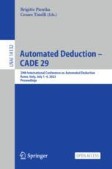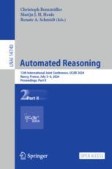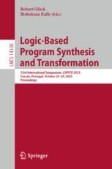Search
Search Results
-
Functions-as-constructors higher-order unification: extended pattern unification
Unification is a central operation in constructing a range of computational logic systems based on first-order and higher-order logics. First-order...
-
Superposition with Delayed Unification
Classically, in saturation-based proof systems, unification has been considered atomic. However, it is also possible to move unification to the...
-
A Higher-Order Vampire (Short Paper)
The support for higher-order reasoning in the Vampire theorem prover has recently been completely reworked. This rework consists of new theoretical...
-

-
Extending a High-Performance Prover to Higher-Order Logic
Most users of proof assistants want more proof automation. Some proof assistants discharge goals by translating them to first-order logic and...
-
Equational Anti-unification over Absorption Theories
Interest in anti-unification, the dual problem of unification, is rising due to various new applications. For example, anti-unification-based...
-
Making Higher-Order Superposition Work
Superposition is among the most successful calculi for first-order logic. Its extension to higher-order logic introduces new challenges such as...

-
Formal Models Based on Unification
In the development of natural language processing, the earliest automatic grammatical analysis theory was phrase structure grammar proposed by...
-
Unranked Nominal Unification
In this paper we define an unranked nominal language, an extension of the nominal language with tuple variables and term tuples. We define the...
-
Tableaux for Automated Reasoning in Dependently-Typed Higher-Order Logic
Dependent type theory gives an expressive type system facilitating succinct formalizations of mathematical concepts. In practice, it is mainly used...
-
Towards Fast Nominal Anti-unification of Letrec-Expressions
This paper describes anti-unification algorithms for computing least general generalizations of two expressions in a functional programming language...
-
Predicate Anti-unification in (Constraint) Logic Programming
The concept of anti-unification refers to the process of determining the most specific generalization (msg) of two or more input program objects. In...
-
Unification Modulo Equational Theories in Languages with Binding Operators (Invited Talk)
Unification (i.e., solving equations between terms) is a key step in the implementation of logic programming languages and theorem provers, and is...
-
Extending a brainiac prover to lambda-free higher-order logic
Decades of work have gone into develo** efficient proof calculi, data structures, algorithms, and heuristics for first-order automatic theorem...

-
Extensional Higher-Order Paramodulation in Leo-III
Leo-III is an automated theorem prover for extensional type theory with Henkin semantics and choice. Reasoning with primitive equality is enabled by...

-
Making Higher-Order Superposition Work
Superposition is among the most successful calculi for first-order logic. Its extension to higher-order logic introduces new challenges such as...
-
RobôCIn SSL-Unification: A Modular Software Architecture for Dynamic Multi-robot Systems
RobôCIn robotics team has participated in the RoboCup Small Size League since 2019 and is currently a two-time world champion (Division B) and...
-
A Unification of Heterogeneous Data Sources into a Graph Model in E-commerce
The incorporation of heterogeneous data models into large-scale e-commerce applications incurs various complexities and overheads, such as redundancy...

-
Local XOR Unification: Definitions, Algorithms and Application to Cryptography
Unification techniques have been proven to be useful for formal analysis of cryptographic systems. In this paper, we introduce a new unification...
-
Superposition for Full Higher-order Logic
We recently designed two calculi as step** stones towards superposition for full higher-order logic: Boolean-free...
